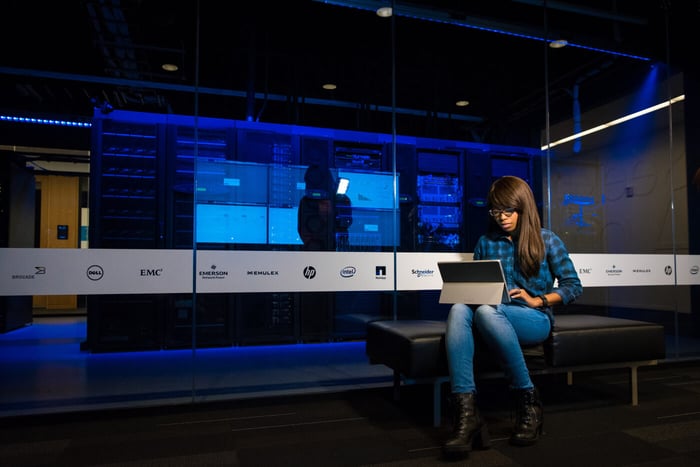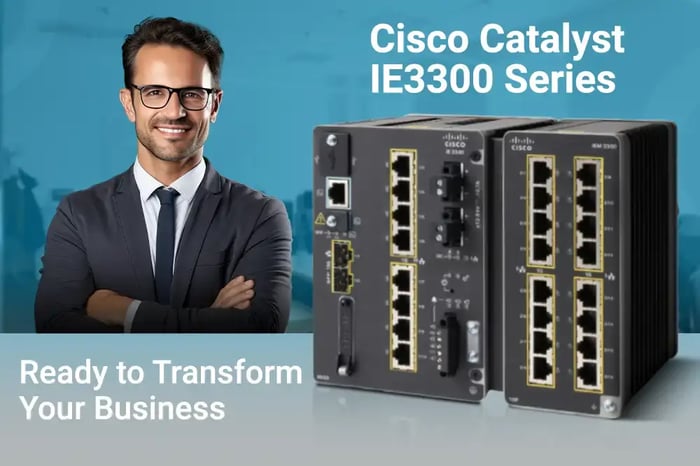You have no items in your shopping cart.

Best Switches for Data Centers
 Govind Jha
Comparison
|
Buying Guide
|
Switch
Govind Jha
Comparison
|
Buying Guide
|
Switch
12/19/2022 10:37am
9 minute read
Learn about the unique needs of data centers and the best data center switches, along with an in-depth analysis of their features.
Network switches for data centers are a rather tough choice with limited options.
They are limited because networking switch products businesses can trust and rely on are scarce. Data centers are the core systems or storage houses from where all the essential services, resources, and applications are made available to the respective users and market.
What is a Data Center?
A data center is often described as a physical facility that houses various data, applications, and systems for organizations of all shapes and sizes, regardless of the business domain. Data storage, security, and IT operations that support business continuity are the top concerns for organizations and businesses worldwide.
A data center is typically designed considering the organization's storage, computation, security, and scalability needs. Data centers allow companies to deliver their applications and data to the public.
Although data centers are made to store, secure, and protect sensitive data and information, their architecture can vary significantly based on the type of data center. For example, a government data center would have different architecture and security layers, both physically and logically, as it houses classified and sensitive data.
In comparison, the build and design of a private data center would be the opposite. Cloud technology is leading the IT industry from the front, and the concept of small private in-house data centers has changed over time. SMBs are typically choosing cloud storage and services over the traditional on-premise data centers that cause extra money, staffing, security, and maintenance.
Some reports suggest that the current global number of data centers is more than 7 million and increasing. This number includes both private, public, and Cloud Data Centers.
Amazon, Google, and Microsoft own the most numbers of Data centers in the world.
What are the key components of a Data Center?
Data centers consist of critical components, including network firewalls, switches, routers, servers, storage units, NAC, surveillance cameras, power sources, network racks, and much more.
These components are critical and must-have devices and technologies to build and design any data center.
Another big concern for enterprises is data center design that offers scalability, security, flexibility, and resiliency. To support smooth business continuity and application availability, data centers can provide high availability of applications and resources uptime from 99.671% to 99.995%.
Why use network switches in the Data Center?
The functionality of ethernet/gigabit switches is pretty similar regardless of where it is deployed. Even in data centers, network switches are primarily responsible for data transmission. They also enhance the network traffic performance at the data link and network layers while ensuring optimal security.
Somehow, unlike standard ethernet switches, which can not offer the required data transfer rate, data center switches are designed and optimized to provide speed in gigabits. The data center switches ensure bandwidth is never choked and traffic passes through them uninterruptedly.
What is the difference between standard switches and data center switches?
Although both switches have the same functionality and purpose, data center switches are costly and are optimized to process heavy network traffic. These switches offer virtualization capability and tighter access control. Furthermore, the redundant power supply with appropriate cooling features provides faster application performance and cloud-level scalability. Usually, the data center switches also consist of all SFP interfaces that support 1G/10G/25G and additional unified ports for 40G/100G/400G, which is far less than standard ethernet switches.
Data Center switches' hardware design and build quality also differ from typical enterprise or business switches. These switches are expensive and have different licensing and support types.
What are the best choices for Data Center switches?
One can easily find a bunch of switching products in the market. However, getting a specific switching solution that meets the needs and matches technical specifications is challenging. A data center is a critical facility, and one can not compromise the quality, service, and support of its products, systems, and technology.
There are many deciding factors for purchasing a network switch for your data center environment, such as:
- The manufacturer's reputation in the market
- Familiarity with the product
- Ease of use
- Security
- Support services
- RMA timeline
As there are only a few trusted names in the network switching industry, we, as Network Devices, recommend Cisco, Juniper, and Aruba. Based on our product and market research, we mention some of the best Data Center switching solutions available in the market below.
1. Cisco Nexus Switches
The Nexus switches from Cisco are undoubtedly the best choice among data center switches. The Nexus series has excellent features and a power-packed performance delivery that boosts network connectivity and operations.
- These switches offer virtualization characteristics for quick scalability needs.
- Deeper security and traffic visibility empower administrators to actively monitor their DC infrastructure for malicious or unusual traffic behavior.
- The efficient power supply and cooling drive help businesses sustain heavy DC operations while lowering costs and increasing switching capacity.
- These switches can be deployed in Spine-Leaf architecture or as per the requirement. Further, the Nexus switches support ethernet ports from 1G to up to 400 G.

Cisco offers a variety of choices in the Nexus series family of switches. Some of them are
Scalability and security are always top concerns in the network industry. With the Nexus series, the scalability and security concern is easily managed. By using the Cisco Nexus Dashboard, enterprises can configure, analyze, and operate from a single dashboard across the public cloud and DC environments.
The Nexus series can be seen in large-scale DCs like Cisco Data Center, Amazon Data Center, Microsoft Data Center, and even in cloud Data Centers.
2. Cisco Catalyst Series
Cisco Catalyst switches are another leading choice for data center infrastructure. The ease of management and ability to operate in both the L2 and L3 layers make them even more compatible with enterprise-grade data centers. Unlike the Cisco Nexus series, the Catalyst series switches cost less while delivering robust performance and scalability.
Cisco claims the Catalyst switches can be used in networks and layers of any size. In-house DC, private cloud, or an enterprise DC environment, the Catalyst series fits all.
The Cisco Catalyst switches are the best deal for organizations with relatively small sizes and in-house data centers. Budget is an important factor for small enterprises, and they can not neglect it. The Catalyst series also fits the pocket of small businesses that want to implement on-premise data centers.
3. Juniper QFX Series
Juniper is an old veteran in the networking industry. Juniper appliances are well-known for delivering robust performance and resiliency. Juniper develops and offers a wide range of product portfolios, from switches to routers and firewalls. Network professionals mostly go for Juniper switches due to their capability to perform as L2 and L3 network layer switches with support for routing protocols.
Juniper has yet again impressed network professionals and enterprise businesses with its QFX Series Switches specially designed for large-scale data centers. With Juniper QFX, the Spine-Leaf architecture is now more secure and easy to deploy, even in complex networks and giant DC environments.
For organizations with Campus network design, the EVPN & VXLAN and IP fabric capability provide large corporations with a standard framework to manage their networks. This feature offers L2 and L3 network connectivity with simplicity, security, agility, and scalability while reducing operational costs.
Juniper QFX series supports large, dense IP fabrics and fast 400GbE that have been validated in internet-scale technology. The QFX series is ideal for data centers providing cloud services like Amazon Data Centers (AWS) and Google Data Centers (GCP).
Juniper claims customers have achieved 90% faster deployment time, 70% resolution, and 83% OpEx reduction. Like other enterprise-grade switches, the QFX series offers IP fabrics and 10/25/40/50/100/200/400G interface options.
The QFX series switches have advanced features like Data Packet Timestamping, Network Automation, and bidirectional throughput up to 25.6 Tbps. They are made to process dense traffic in large Data Centers.
4. Aruba CX 10000 Switch Series
HPE Aruba is making headlines with its most powerful CX 10000 switch series for next-generation cloud and enterprise data centers. The architectural design of Aruba CX 10000 switches results from highly distributed, hybrid, and multi-cloud infrastructure demands.
With the CX 10000 series, Aruba has addressed the need for stateful software-defined networks and services. The advanced industry-standard Leaf-Spine networking architecture can be further distributed in stateful segmentation for the east-west firewall for network traffic. This feature allows enterprises to build and implement zero-trust segmentation across the data center environments on each access port, where critical and sensitive applications and databases reside.
A unique pre-built time series database allows administrators to utilize software scripts to analyze past trends while historical troubleshooting. According to Aruba, this would help predict and avoid future issues caused by scale-up, security, and performance bottlenecks.
Aruba CX10000 costs less than its competitors in this price segment without compromising feature offerings in terms of security and performance. The CX10000 offers a 3.6 Tbps bi-directional switching capability and interface options with the support of up to 100G.
Choosing a Data Center Switch
Choosing a Data Center switch is critical as many factors are involved, not only performance and scalability. Enterprises tend to look for better support and stable performance with unique features that allow them to configure and deploy the switching solution per their requirements.
Furthermore, the customization and programmability characteristics further enhance the security posture and boost traffic flow across the network.
Please CONTACT Network Devices for further questions.
Related Articles
Data Center Network Switch Upgrades: A Complete Guide [2025]
6 minute read
01/09/2025 10:16am
Cisco 350 Series: Easy-to-Use, Managed SMB Switches
3 minute read
12/19/2022 10:31am
Cisco Catalyst IE3300 Series: Ready to Transform Your Business
3 minute read
12/19/2022 10:32am








![Data Center Network Switch Upgrades: A Complete Guide [2025] - A visual of modern network switches stacked to represent advanced data center infrastructure.](https://dropinblog.net/cdn-cgi/image/fit=scale-down,width=700/34248472/files/featured/data-center-network-switch-upgrades-guide-2025.webp)



